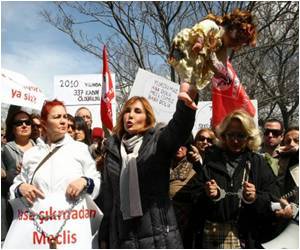After years, sometimes decades of neglect, Budapest's historic thermal baths are in different stages of renovation to restore crumbling and rotting infrastructure to their heyday state.

But the state of the facilities is as varied as their styles, and much of the work done so far has involved cosmetic or emergency fixes as a shortage of funds hampers the constant battle against the baths' complete disintegration.
No mason since the 1950s has set foot in the state-owned Kiraly spa -- one of the oldest and grandest in Budapest, built in 1565.
The result is crumbling mortar, rusty pipes and an overspilling Turkish pool below a dome dotted with tiny circular windows each with its own trail of black rot.
"It is ripe for renovation," but work will start at the earliest in two years' time, Laszlo Miko, an architect involved in planning the reconstruction, told AFP, citing bureaucratic authorisation processes.
No funding source has yet been identified for Kiraly's facelift.
Advertisement
But the interior is state-of-the-art after a massive upgrade in 2005-06, to be followed by an exterior spruce-up shortly.
At the ancient Racz Turkish bath, 75-percent privately owned, a makeover was recently completed by private entrepreneurs.
Some of Budapest's baths are in private hands, some are the property of the municipality and yet others of the state.
Local government financing taps were closed five years ago by the then-leadership of Budapest, but a new municipality last year approved a one-off 710-million-forint (2.5-million-euro, $3.6-million) injection for the general management of the baths, as well as restoration work.
This represented 0.03 percent of the city's overall expenses for 2010.
With state money in short supply in tough economic times, 80 percent of the Rudas renovation, which cost nearly 500 million forints (1.8 million euros, $2.6 million), was funded by the European Union, according to Gyorgy Kozak, development director of Budapest Healing Baths and Hot Springs Ltd.
The spa company, which is municipality-owned and operates 13 baths and open-air pools in the city, including some of its more elegant ones, plans to apply for more EU funding for its other facilities as well.
Not that the baths' clientele, almost equally composed of tourists and locals, seems to care much about the dereliction.
On a recent morning, as Kiraly filled with visitors from Italy, Holland and France eager to experience Hungary's famous thermal waters, no one seemed to mind the decaying walls, the leaking windows and rattling showers.
"This is such authentic, beautiful architecture," said a student from Lausanne, Switzerland, relaxing in the 40-degree water of a small pool under the great dome.
More than simply carrying out urgently needed renovations, bath owners now also want to expand their appeal.
Indeed, with the exception of a few, the baths bleed money with running costs far exceeding ticket income.
"Stand-alone baths are generally loss-making everywhere in the world and are in many places subsidised," Kozak pointed out.
The Gellert, on the other hand, a sumptuously renovated Art Nouveau bath complex that includes a hotel -- an amenity most other Budapest baths lack -- is one of four spas in the city that actually make money.
By building adjacent accommodation, owners thus hope their baths can attract visitors seeking longer treatments, rather than city-hopping tourists on a short visit, said Kozak.
"If guests could walk from their rooms to the baths in slippers, they would stay for medical treatments lasting for weeks instead of the one-off visits during a long weekend," added Szilvia Czinege, BGYH's marketing chief.
Budapest boasts over a hundred thermal springs, feeding its host of spas with some 70 million litres of certified medicinal waters daily.
Source-AFP









